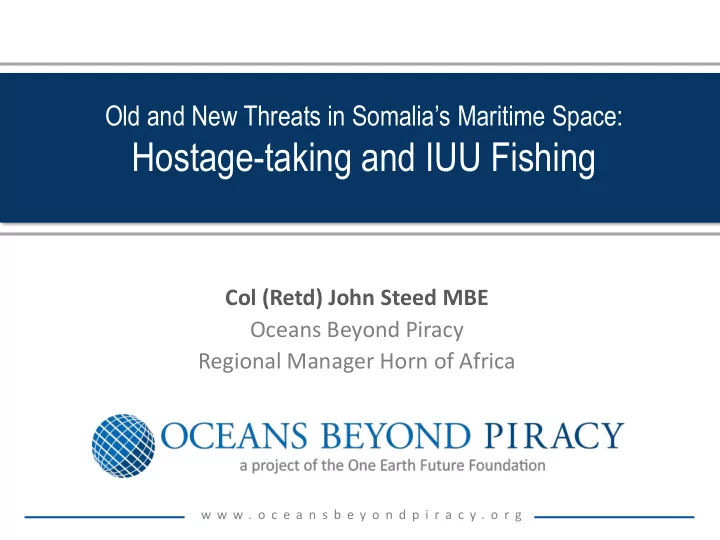

Old and New Threats in Somalia’s Maritime Space: Hostage-taking and IUU Fishing Col (Retd) John Steed MBE Oceans Beyond Piracy Regional Manager Horn of Africa w w w . o c e a n s b e y o n d p i r a c y . o r g
Addressing Somali Piracy Objective Reporting Coastal/Maritime Development State of Maritime Securing Piracy 2014 Somalia’s Fisheries Coastal Development Fighting Piracy Ashore Maritime Communications Initiative Seafarer Support - Hostage Support Partnership
Current Status – Defining the Threat Recent attacks have not been documented by major reporting centers. Major Publically Reporting OBP Reported Centers Hijacked 0 5 0 Vessels Armed 1 1 Not Robbery Reported Failed 0 15 0 Attacks Crew of the Shiraj – held since April Suspicious 1 29 1 Event False Alarm ~60 Not Not Reported Reported
Risk of Piracy Resurgence in Galmudug • Few viable economic alternatives in Galmudug • Weak governance and rule of law structures • Provocations from IUU fishing off Somali coast/in Somali EEZ • Little capacity building in counter-piracy efforts “Poverty, unemployment, and illegal fishing are the main causes of involving youth into piracy activities” “I’m sure soon or later, pirates will re -organize themselves if things have not changed quickly”
IUU Fishing in Somali Waters Illegal: fishing in contravention of law Unreported: fish catch not reported to Somali authorities Unregulated: fishing where management is not enforced or where detailed knowledge of fishery resources is lacking GPS monitor showing location of Iranian fishing boat around Somalia in late 2014; expired fishing license for same boat; catch aboard same boat, potentially caught illegally in Somali waters. Photos by Andy Hickman; Source: “Securing Somali Fisheries,” available at SecureFisheries.org
IUU Bottom Trawlers Target Coastal Waters Poseidon , fishing illegally Trawling vessels have: in Somali waters in 2014 - Operated continuously for two decades in Somali waters - Concentrated close to shore in sensitive shallow water habitats - Interacted, sometimes destructively, with Somali fishers - Damaged over 120,000 sq km of marine habitat that will take more than 8 years to recover – if all trawling stopped today Photo by Andy Hickman Source : “Securing Somali Fisheries” study by Secure Fisheries. Available at: securefisheries.org
(Over)fishing in Somali Waters 300,000 Foreign vessels Somali vessels 250,000 200,000 Catch (mt) 150,000 100,000 50,000 0 1981 1986 1991 1996 2001 2006 2011 Source: “Securing Somali Fisheries” study by Secure Fisheries. Available at: securefisheries.org
Link Between IUU and Piracy “The illegal fishing in Somalia has tremendously reduced the fishing activities of local businesses, leading to low production. … The fishermen fear the foreign illegal fishing ships will overrun them in the middle of the night, killing or seriously injuring them by firing their sophisticated armaments. These large, modern fishing vessels are depleting our catch. The illegal fishing initiated Somali piracy, which in turn affected the cost of daily life here. The price of commodities went up, which affected my business and daily life.” -Jama Mohamud Ali, Puntland
Human Cost of Piracy - Hostage Support
Human Cost of Piracy • Objective 1: Monitor and Track all Hostages in Somalia (Pirate Victims and other hostages) • Objective 2: Provide support in captivity (captives and families) • Objective 3: Facilitate recovery to a safe location • Objective 4: Assist with repatriation to home country • Objective 5: Provide victim support post release
Human Cost of Piracy Major Publically Reporting OBP Reported Centers Seafarers 26 26 41 Held Hostage Non Seafarers Not Not 4 Held by Reported Reported Pirates Escaped Not Not 38 Reported Reported Total 26 26 45 Hostages Held
Even after release the pain goes on !
Capacity Building in Somalia Maritime Communications Initiative – The MCI promotes regional cooperation and communications to increase the safety of seafarers in the region by establishing Maritime Operations Centres in major Somali ports (Berbera, Bosasso, Mogadishu and Ph 2 Kismayo and Hobyo) The Maritime Operations Centres: • Establish maritime situational awareness • Improve information sharing • Increase understanding of local vessel and fishing habits • Provide a point of contact for seafarers on maritime safety issues • Serve as local point of contact for international navies FGS EUFRT Crew members conduct communications training with Somaliland Coast Guard in Berbera, February 2016 Photos by Ben Lawellin
Recommend
More recommend